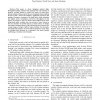Free Online Productivity Tools
i2Speak
i2Symbol
i2OCR
iTex2Img
iWeb2Print
iWeb2Shot
i2Type
iPdf2Split
iPdf2Merge
i2Bopomofo
i2Arabic
i2Style
i2Image
i2PDF
iLatex2Rtf
Sci2ools
106
click to vote
INFOCOM
2009
IEEE
2009
IEEE
Optimal Fast Hashing
Abstract—This paper is about designing optimal highthroughput hashing schemes that minimize the total number of memory accesses needed to build and access an hash table. Recent schemes often promote the use of multiple-choice hashing. However, such a choice also implies a significant increase in the number of memory accesses to the hash table, which translates into higher power consumption and lower throughput. In this paper, we propose to only use choice when needed. Given some target hash table overflow rate, we provide a lower bound on the total number of needed memory accesses. Then, we design and analyze schemes that provably achieve this lower bound over a large range of target overflow values. Further, for the multilevel hash table scheme, we prove that the optimum occurs when its subtable sizes decrease in a geometric way, thus formally confirming a heuristic rule-of-thumb.
Related Content
| Added | 24 May 2010 |
| Updated | 24 May 2010 |
| Type | Conference |
| Year | 2009 |
| Where | INFOCOM |
| Authors | Josef Kanizo, David Hay, Isaac Keslassy |
Comments (0)

